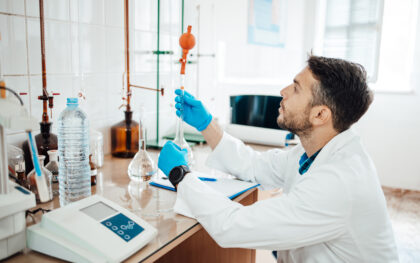Risk Assessment of Foodborne Contaminants – course

Food safety is threatened by many different hazards such as foodborne zoonoses and chemical contaminants. Through this course, you will be equipped with competences and tools to perform food-safety risk assessment and learn how such risks can be managed and communicated.
You wil get an interdisciplinary approach to risk analysis within food safety. Risk analysis is an internationally recognized decision-making concept for assessing food safety and establishing principles for consumer protection.
The focus of the course is on risk assessment. However, risk management and decision-making, risk communication, risk perception, and acceptance among various stakeholders are touched upon as well.
Risk analysis consists of risk assessment, risk management and risk communication.
The risk assessment component is the scientific, structured and systematic process that aims to analyse the potential harmful consequences of specific exposures to chemical or microbial contaminants in food.
In addition, you will get to discuss the possible synergies and conflicts between sustainable food production and managing food risks.
During the course, you will be working with:
- Risk analysis and risk assessment concepts
- Hazard identification and characterization
- Exposure assessment
- Predictive modelling
- Dose-response
- ADME – absorption, distribution, metabolism and excretion
- Toxicodynamics
- Genotoxicity
- Qualitative, semi-quantitative and quantitative risk assessment
- Uncertainty and variability in risk assessment
- Risk assessment versus HACCP
- Synergies and conflicts between risk and sustainable assessments
- Options for risk management
- Risk communication and risk perception
Profile of participants
The course is relevant for employees in the public and private sector working with food production, particularly, in the intersection between sustainability, food safety and security, and innovation.
Learning Outcomes
Your outcome
Once you have completed the course, you will be able to:
- Describe the international principles for chemical and microbiological risk analysis.
- Explain the principles for surveillance and control of chemical substances and harmful microorganisms throughout the food production chain.
- Analyse relevant data (e.g. monitoring/surveillance data and laboratory results) and interpret these for risk assessment.
- Develop simple quantitative risk assessments and interpret the results of risk assessments made by others.
- Participate actively in the assessment and management of foodborne risks.
- Recommend further investigations or implementation of measures to ensure effective prevention and control, and ensure that sustainability is not compromised through such measures.
- Summarise and present the results of epidemiological studies and risk analyses to various groups, including national and international authorities, food manufacturers and consumers.
- Recommend activities that can address current national and international food safety issues.
Outcome for your organization
Your organization gets an employee who will be able to:
- Identify potential hazards occurring in specific food products.
- Identify and analyse relevant data to assess the risk of such hazards in food – how dangerous is it? What are the consequences?
- Propose options to mitigate such hazards.
- Balancing actions to optimize food safety and sustainable food production.
- React to national and international food safety issues.
Admission requirements
The course is part of the Master’s programme ‘Master of Sustainable and Safe Food Production‘.
You can follow the course as part of the Master’s programme or you can follow it as a single course. Please note, that to get most out of this course, we recommend that you have passed two other courses linked to the Master’s programme. See more under prerequisites.
Part of the Master’s programme
If you wish to follow the course as part of the Master of Sustainable and Safe Food Production, please go to the Master’s programme page and sign up for the Master’s programme.
Single course
If you wish to follow this course as a single course, please sign up by clicking the button ‘Add to basket’ in the top of the page.
Admission
To be admitted to this course, you must:
- have achieved a relevant medium-cycle education (a professional bachelor’s degree or the like) or a long-cycle higher education programme
- have a minimum of two years of work experience in the food science and technology field
Furthermore, you must have a solid foundation in the natural sciences (biology, chemistry, mathematics) as well as an understanding of technical processes in food production lines.
Recommended prerequisites
We recommend that you complete the courses ‘Chemical Food Safety’ and ‘Microbial Food Safety in a Global Perspective’ prior to following this course.
Education sessions and exam
Education session
The course is taught online, the language of instruction is English.
The education sessions consist of e-lectures, Q&A sessions, assignments, casework and a final report.
The e-lectures are available online which means that you can watch them whenever from wherever.
Furthermore, you are offered weekly live Q&A sessions to get in dialogue with the course lecturer and fellow participants.
The majority of the course material will be provided during the course (selected chapters from textbooks, scientific articles, popular science articles, newspaper article, reference webpages).
Information about the software that will be used for the quantitative risk assessments will be provided at course start up.
Exam
The exam consists of two reports describing self-selected case studies: one in chemical (counts 50% of the grade) and one in microbiological risk assessment (counts 50% of the grade). The reports must be written in English.
The course is offered in the spring in even years (2022, 2024 etc.)
Registration
| Duration | 13 weeks |
|---|---|
| Place | Online |
| ECTS | 10 |
| Start | September 2024 |
| Price |
20.000,00 DKK |
|---|

Questions?
Contact Tine Hald
Professor
Phone: (+45) 35 88 70 94
Email: tiha@food.dtu.dk
Related educations
-
 Course
Master
English
10 ECTS
Course
Master
English
10 ECTS
Sustainable Food Production and Processing – course
- Start
- February 2025
- Duration
- 13 weeks
- Price
- 20.000,00 DKK
-
 Enkeltfag
Engelsk
5 ECTS
Enkeltfag
Engelsk
5 ECTS
Diskret matematik
- Duration
- 13 uger
- Price
- 7.500,00 DKK
-
 Course
Master
English
7.5 ECTS
Course
Master
English
7.5 ECTS
Chemical Food Safety – course
- Start
- February 2024
- Duration
- 7 weeks (incl. 1 week Easter break)
- Price
- 15.000,00 DKK
-
 Master
English
60 ECTS
Master
English
60 ECTS
Master of Sustainable and Safe Food Production
- Start
- February 2024
- Price
- 125.000,00 DKK
For companies
Are you looking to educate several employees with a course or a degree?
Mail us at learnforlife@dtu.dk
